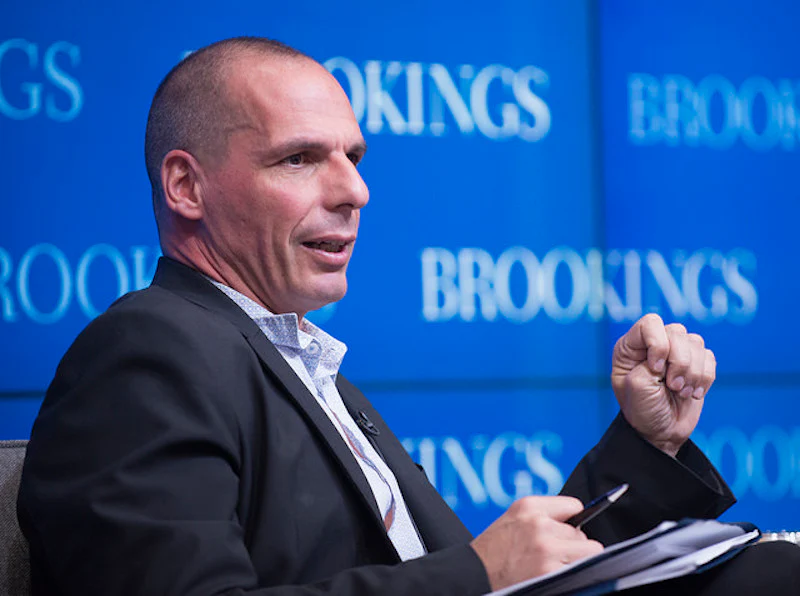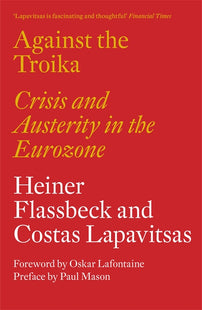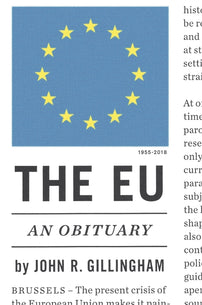Yanis Varoufakis’s Account of the Greek Crisis: a Self-Condemnation — Part Two: Surprising Relations with the Political Class
In his book Adults in the Room, Yanis Varoufakis gives us his version of the events that led to the Tsipras government’s shameful capitulation in July 2015. In part two of a series of articles analyzing the book, Eric Toussaint examines Varoufakis's questionable account of the origins of the crisis and his coziness with the Greek political class.

See Part One of Eric Toussaint's analysis of the revelations contained in Yanis Varoufakis's recent memoir, Adults in the Room.
First published by CADTM. Translated by Snake Arbusto in collaboration with Vicki Briault.
In his latest book Adults in the Room, Yanis Varoufakis gives us his version of the reasons behind the Tsipras government’s shameful capitulation in July 2015. It essentially analyses the period 2009-2015, though it makes incursions into earlier periods.
In my first article on the subject of this book, I analysed critically the proposals made by Yanis Varoufakis before he became a member of the Tsipras government in January 2015, demonstrating that those proposals were doomed to fail. This second article covers the ties Yanis Varoufakis maintained with Greece’s ruling political class (both the PASOK, historically linked to social-democracy, and the conservative New Democracy) for several years.
On several occasions, Yanis Varoufakis mentions the broad range of his relations with members of the Greek political milieu. He stresses his past friendship with Yanis Stournaras (the current Governor of the Bank of Greece, an ally of Mario Draghi and of the private Greek and foreign bankers), his good relations in 2009 with George Papandreou (who implemented the policies leading in May 2010 to the first Memorandum of Understanding) and his relationship with Antonis Samaras (who led the Greek government after the second Memorandum of Understanding), and he devotes a large part of the first four chapters of the book to relating how a close collaboration, and at times a complicity, was formed with three Syriza leaders. Those leaders were Alexis Tsipras (who led the Greek people into the third Memorandum of Understanding) and Nikos Pappas (Tsipras’s alter ego, who became a Minister of state in the first Tsipras government), added to whom, along the way, was Yanis Dragasakis (before he became vice-Prime Minister of the first and second Tsipras governments). In this second part, I will deal with Varoufakis’s account of the start of the crisis in Greece and his relations with Greece’s traditional political class.
Varoufakis’s account of the events leading to the imposition of the first Memorandum of Understanding in May 2010 is highly questionable. While defending his position, at the same time he reinforces the official narrative according to which the cause of the crisis lies in the inability of the Greek state to deal with its public debt. While he condemns the sorry state Greece’s private banks had put themselves in, he puts the accent on the Greek state’s inability to deal with that situation and declares that Greece should have resorted to bankruptcy. 1 He rules out the possibility that was “offered” to the state to refuse to take responsibility for the banks’ losses. His reasoning regarding the failure of the Greek state is based on the fact, according to him, that the liabilities (that is, the debts) of the private banks were the state’s responsibility, and that nothing could be done about that. The private banks’ liabilities were so extensive that the Greek state was incapable of assuming them. And yet, at certain points in history, States have refused to assume the losses of private banks. Iceland did it beginning in 2008 when its private banking sector collapsed, and with very positive results. Iceland victoriously stood up to the threats of Britain and Holland. 2
Saying that Greece is not Iceland and/or that Greece is part of the Eurozone is not enough to put an end to the debate. Varoufakis’s attitude, in reality, is economically and socially conservative. He condemns the Greek bankers, but the solution he proposed to Alexis Tsipras beginning in June 2012 consisted in transferring ownership of Greece’s banks to the European Union. 3
It is also clear that there was every reason to challenge the repayment of Greece’s public debt, which had increased greatly mainly in the 1990s due to the pursuit of illegitimate goals (excessive military expenditure, financing fiscal gifts to major corporations and wealthy citizens, financing reductions in corporate contributions to social security using debt, etc.) or to financing the debt under illegitimate conditions (abusive interest rates paid to banks), and using methods characterised by corruption and other illegalities (see Chapter 1 of the “Preliminary Report of the Truth Committee on Greece’s Public Debt”).
Varoufakis and the government of George Papandreou (PASOK) 2009-2011
In the autumn of 2009 a new Greek government was elected on the promise of higher spending as a means of helping the nation’s income mountain recover, but the new prime minister and his finance minister, from the PASOK social democratic party, did not get it. The state was irretrievably bankrupt even before they were sworn in. 4
It is false to say that the state was bankrupt. That statement reinforces the deceitful narrative that is put forward by the Troika and the dominant media.
What Varoufakis does not say is that Papandreou dramatised the public debt and the public deficit instead of making those who were responsible, both in Greece and abroad (that is, the private shareholders, the board members of the banks, and the foreign banks and other financial entities who contributed to generating the speculative bubble), bear the cost of the banking crisis. The Papandreou government falsified the statistics on Greece’s debt — not in the period before the crisis, in order to reduce it (as the prevailing narrative claims), but in fact in 2009, to increase it. That is demonstrated very clearly by the Truth Committee on Greece’s Public Debt in its June 2015 report (see chapter II, p. 17). Instead of blowing the whistle on the falsification, Varoufakis takes the statements made by Papandreou and his Finance Minister on the dramatic state of public finances at face value.
After the parliamentary elections of 4 October 2009, the newly elected government of George Papandreou illegally revised and increased both the public deficit and public debt figures for the period before the Memorandum of 2010. The public deficit estimation of 2009 was revised upward several times, from 11.9% of GDP in the first estimate to 15.8% in the final one. Andreas Georgiou, who was Executive Director of the Greek statistics bureau ELSTAT in 2009-2010 (despite the fact that he was still on the staff of the IMF), was sentenced by a court in August 2017. Here is what the French daily Le Monde wrote in its 1 August 2017 issue:
Andreas Georgiou, former head of the Greek statistics office, Elstat, a key figure in the saga of the false public-deficit figures at the start of the debt crisis, was sentenced Tuesday 1 August to a suspended prison sentence of two years. The Athens criminal court found him guilty of "breach of duty," according to judicial sources. The former International Monetary Fund staff member was prosecuted for collusion with Eurostat (the EU’s statistics office, which is a Directorate of the European Commission) to inflate figures regarding Greece’s deficit and public debt for the year 2009. The presumed goal was to facilitate surrendering control of the country’s finances with the implementation of the first international financial assistance plan in 2010 – the third has been in force since August 2015. 5
Further, contrary to what Varoufakis claims, the private banks did not cut off credit to the Greek state in 2009; it was credit to the private sector that was interrupted during that year. 6 In the fall of 2009, the Greek state was having no difficulty in raising funds. The financial markets cut off credit to the Greek state in 2010, after Papandreou dramatised the situation and at a time when the first Memorandum of Understanding was being launched.
Varoufakis explains at several points in Chapter 2 that despite obvious divergences, he maintained good relations with Papandreou: “In January 2010 in a radio interview I warned the prime minister, whom I knew personally and with whom I was on rather friendly terms, ‘Whatever you do, do not seek state loans from our European partners in a futile bid to avert our bankruptcy.’” 7
On this last point, Varoufakis is right — credit should not have been sought from the Troika. On the other hand, Varoufakis is wrong when he says that the Greek state should have declared itself bankrupt. An alternative, one that was contrary to the policy espoused by Papandreou and different from the one advanced by Varoufakis (bankruptcy of the state), was possible, and necessary.
Following their win in the 2009 elections thanks to a campaign during which they denounced the neoliberal policies of New Democracy, the Papandreou government, had it wanted to make good on its campaign promises, would have had to socialize the banking sector by organizing an orderly failure of the banks and protecting depositors. Several historical examples demonstrate that organizing such a failure and then starting up financial services again to operate in the interests of the population would have been quite possible. They should have taken the example of what had been done in Iceland since 2008 8 and in Sweden and Norway in the 1990s. 9 Instead, Papandreou chose to follow the scandalous and catastrophic example of the Irish government, which bailed out the bankers in 2008 and in September 2010 agreed to a European aid plan that had dramatic consequences for Ireland’s people. When in fact what was needed was to go even farther than Iceland and Sweden and completely and permanently socialize the financial sector. The foreign banks and big private Greek shareholders should have been made to bear the losses stemming from resolving the banking crisis and those responsible for the banking disaster should have been prosecuted. That would have allowed Greece to avoid the successive Memoranda that have subjected the Greek people to a dramatic humanitarian crisis and to humiliation, without any of it resulting in truly cleaning up the Greek banking system.
Varoufakis and Antonis Samaras
Several times, Varoufakis refers to the contact he maintained with personalities in the first rank of Greece’s political class, both members of PASOK and of the leading Conservative party, New Democracy.
One evening (in 2011; ed. note), on returning to our flat after yet another session at ERT, the Greek state radio and TV network, the landline rang. I picked the phone up to hear a familiar voice. It belonged to Antonis Samaras, then leader of the conservative New Democracy party, at the time Greece’s official opposition […] “We have never met, Mr Varoufakis,” he said, “but having just watched you on ERT I felt an urge to call. For I cannot remember the last time I was so touched by something so profound I heard someone say on television. Thank you for your stance.”
He was not the only member of the Greek establishment to approach me. Indeed, my campaign had led to many secret discussions with socialist ministers, opposition conservative members of parliament, trade union bosses and the like who felt I was on to something. Once I outlined my basic analysis, not one of them contested it. […] The conservatives, at least up until November 2011, were a happier lot: with their leader Antonis Samaras adopting an anti-austerity, anti-bailout position, they felt freer to endorse my musings. 10
After receiving a telephone call like this one from Samaras, some people would have asked themselves, “Isn’t it disquieting to receive compliments from one of the key leaders of the Conservative party?” But not Varoufakis.
The friendship between Stournaras and Varoufakis
Varoufakis devotes no less than four pages to describing his friendly relationship with Yanis Stournaras. 11 Between the late 1990s and the period of the Memoranda, Yanis Stournaras moved from PASOK to New Democracy. Varoufakis explains:
[It was he who] convince[d] Berlin and Brussels to let Greece into the euro. Once Greece was securely inside the euro, in 2000 the PASOK prime minister rewarded Stournaras with the Commercial Bank of Greece …. It was during this last phase of his career that we first met. Despite his busy schedule, Stournaras was always on hand to do his share of teaching, and to do it happily and devotedly. While our economic perspectives differed considerably, as did our politics, his commitment to the university and the good chemistry between us provided the foundation for a developing friendship. 12
Varoufakis tells how they spent the evening of the election of 4 October 2009, in which PASOK was victorious, together in Stournaras’s apartment. At that time, Stournaras was a high-ranking advisor of the “socialists” and beginning of 2010 had adopted Papandreou’s pro-Memorandum orientation. Varoufakis continues:
During that momentous year for Greece, 2010, Stournaras made a career move that raised eyebrows, becoming director of an economics think tank originally set up by Greece’s National Confederation of Industries, the largest and most established bosses’ guild in the land, traditionally affiliated to the conservatives of New Democracy.
This did not affect their friendship. A month before the May 2012 elections, Varoufakis was in Athens and called Stournaras:
We met the next day at a café in the lobby of a hotel at the foot of the Acropolis; we hugged …. Turning to business, I briefed him on the discussions I had just had in Berlin with officials from the European Central Bank and the German government, with financial journalists and the like. I also mentioned a conversation I had had with financier George Soros. I told Stournaras that Soros agreed with my assessment of the Greek situation as well as with the gist of my economic policy proposals for Europe as a whole.
Varoufakis explains that Stournaras and he did not reach an agreement on the viability of the Memorandum of Understanding but that they parted with promises to keep their friendship intact. Things went sour a few months later, when Stournaras accused Varoufakis of speculating with Soros on Greek debt securities. That is when their relationship was broken off. Meanwhile, Stournaras had become Minister of Development (May-June 2012). Following the elections in June 2012, he became Finance Minister of the Antonis Samaras government. Then, starting in June 2014, Samaras appointed him Governor of the Bank of Greece, a position he still holds.
I have made a point of summing up this passage in Varoufakis’s book because it is revelatory of the ease with which he moved about in the environment of the Greek political class. Even if he held no official position at the time, he maintained relations with key leaders, and some of his ideas were not rejected, to say the least, by the conservative leaders. Clearly this is not embarrassing to him, since he discusses it at length in the book.
[book-strip index="1" style="display"]



